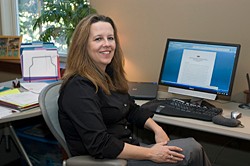
UC Awarded $1.5 Million to Improve Elementary Science Education
The University of Cincinnatis College of Education, Criminal Justice, and Human Services (CECH) is launching a new research-based program to improve teacher quality in elementary science instruction, with the support of a three-year, $1.5 million grant from the U.S. Department of Educations Institute of Education Sciences.
The INSPIRE Urban Teaching Fellows Program will first center on teachers in six elementary schools from a large urban school district in Utah, a district with a high Latino population and children from impoverished backgrounds. The programs success in improving science education could make it a national model for urban school districts, says Carla Johnson, principal investigator of the grant and director of the Furthering Urban STEMM Innovation, Outreach and New Research (FUSION) Center in CECH.
The program is designed to develop professional learning communities of teachers, building a support system for improving science instruction in grades where science has not been emphasized, Johnson says.
Teachers in this district are not only challenged by a lack of content knowledge regarding their own science teaching skills, but also by language barriers in teaching children who are struggling to learn English, many of whom are recent immigrants from Mexico, Johnson says. In addition to science preparation, the UC program will also build on the teachers Spanish-speaking skills.
The program gets underway in March. Over the summer, a professional development science institute will be held for the teachers July 13-23 and Aug. 10-14. Johnson says teachers participating in the program will earn six UC college credit-hours in science education in addition to a $900 annual stipend.
The UC researchers will also be relying on technology in implementing the program. Johnson says each of the participating schools will receive a videoconferencing system that the schools can keep after completion of the program. The videoconferencing system will open face-to-face follow up between the teachers and the UC researchers twice a month.
Webcam classroom viewings three times per year will allow researchers to observe improvement in the Utah teachers science skills in the classroom. Well observe their teaching and then the next morning via Webcam, well debrief with the teachers, Johnson says. Its through this technology that well explore how we can provide this kind of assistance to teachers across the nation.
The program aims to reform five key areas in teaching science at the elementary level
- Improve the instructional design of science lessons and lesson planning
- Improve the implementation of lessons in the classroom, such as making the lesson an interactive experience by planning time for questions
- Build a classroom culture of group learning and engagement
- Develop appropriate science content for the grade level
- Differentiate the instruction using different teaching styles to reach all levels of learners
The UC researchers will examine how the INSPIRE program improves both teaching effectiveness and student learning. State test scores will examine increases in student learning of science content.
Johnson says that once the program is completed, participating schools can continue to use the video technology for science education, such as videoconferencing programs with NASA.
Related Stories
OTR mural centerpiece of 'big' celebration of UC alumni
April 26, 2024
New downtown artwork salutes 18 alumni award recipients who personify UC’s alumni success.
UC Exercise Science Expo highlights community connections and...
April 24, 2024
On March 28, 2024, the University of Cincinnati’s Exercise Science (EXSC) program, part of the School of Human Services, hosted the university’s inaugural Exercise Science Expo in the Tangeman University Center. The event, which was open to UC EXSC students, brought together industry representatives, community partners and recent alumni for a full day of networking, special speakers, internship and job opportunities, and more.
UC's record graduating class prepares for next chapter
April 22, 2024
UC will confer degrees to 7,521 degrees to 7,391 students. (Some students are earning multiple degrees.) Both represent new records at UC for a single graduating class dating back two centuries.
